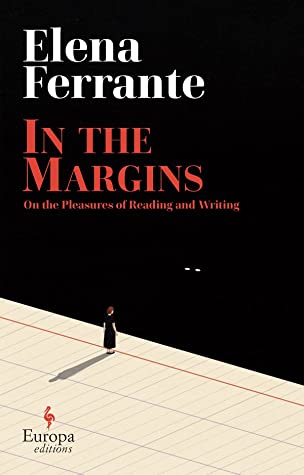In the Margins: On the Pleasures of Reading and Writing by Elena Ferrante
Europa Editions | $20.00 | Hardback | 9781609457372 | 176 pages | March 15, 2022
If you are a fan of Elena Ferrante, this is the book for you. If you’re wondering about the Ferrante hype, this is also the book for you. In the Margins originated as a series of lectures Ferrante gave at the University of Bologna. She discusses her work as a writer, including her technique, her influences and her struggles. Writers will be inspired by these essays. Writing is hard work, it can be frustrating but it’s worth the struggles in the end. Writing has an inherent power to connect, to educate, to comfort. You’ll want to spend time absorbing these essays.
I might be the only reader who hasn’t yet read all of the “Neapolitan novels.” I liked My Brilliant Friend but wasn’t blown away at the time. I do want to circle back to the others. I have become a fan through her other works. I quite liked The Lost Daughter. It’s a dark, honest and thoughtful novel about the challenges of being a mother. In anticipation of this essay collection, I recently read Incidental Inventions, essays Elena Ferrante wrote as a columnist for The Guardian. The topics covered include feminism, friendship, motherhood, writing, insomnia, addictions, nationalism, death and the recent film adaptation of The Lost Daughter—“I’m attached to that book in a particular way. I know that, with it, I ventured into dangerous waters without a life preserver.”
Like many successful writers, Ferrante is an avid reader and she started writing at a young age. She amasses journals filled with her stories and thoughts. Discussing her youth, she said: “I read a lot, but what I liked was almost never written by women. It seemed to me that the voice of men came from the pages and that voice preoccupied me, I tried in every way to imitate it.” She discusses the writing of Emily Dickinson, Virginia Woolf, Gertrude Stein and Dante, among others.
In her writing, Ferrante doesn’t hesitate to show the underbelly of humanity, the darkness. That makes her writing so strong and appealing. She explains: “Anyone who has literary ambitions knows that the motivations, both great and small, that impel the hand to write come from “real life”: the yearning to describe the pain of love, the pain of living, the anguish of death; the need to straighten the world that is all crooked; the search for a new morality that will reshape us; the urgency to give voice to the humble, to strip away power and its atrocities; the need to prophesy disasters but also to design happy worlds to come from there.” She said: “Beautiful writing becomes beautiful when it loses its harmony and has the desperate power of the ugly. And characters? I feel they are false when they exhibit clear coherence and I become passionate about them and do the opposite.”
Thank you to Europa for sending a copy.







You must be logged in to post a comment.